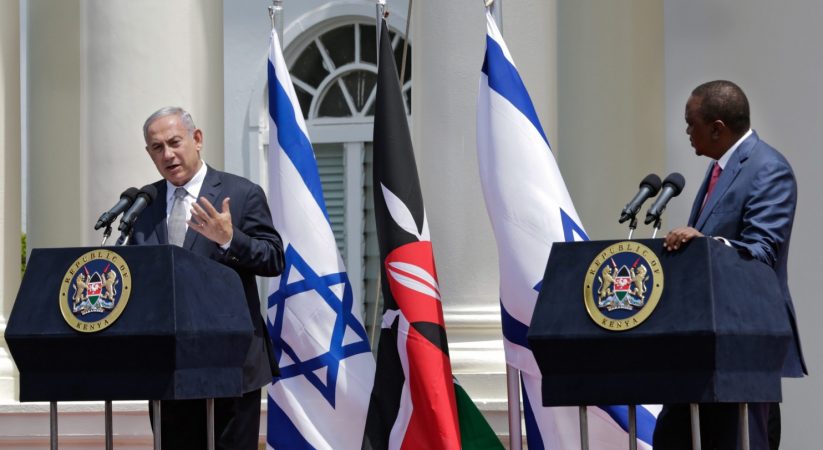
Israeli Prime Minister Benjamin Netanyahu, left, gestures during a joint news conference with his Kenyan counterpart, Uhuru Kenyatta, at the State House in Nairobi on July 5. (Daniel Irungu/European Pressphoto Agency) |
The Washington Post | | NAIROBI — “Israel is coming back to Africa, and Africa is coming back to Israel,” Israeli Prime Minister Benjamin Netanyahu told Kenyan President Uhuru Kenyatta in a joint news conference in Kenya’s capital Tuesday.
The occasion marked the first official visit by an Israeli premier to sub-Saharan Africa in 30 years. Netanyahu, who arrived in neighboring Uganda on Monday, will also visit Rwanda and Ethiopia in coming days.
In Uganda, Netanyahu held a summit with leaders of seven African nations meant to strengthen ties. Israel will aim to provide them with its expertise in security and technology, while in exchange receiving support from new friends who it hopes will refrain from criticizing Israeli policies and provide diplomatic backing in international forums.
Israel’s ties with some of its longtime allies such as the United States and the European Union recently have come under strain. Netanyahu’s right-leaning government has drawn sharp criticism in the United States and Europe over its failure to reach a peace agreement with the Palestinians and its continued building of Jewish settlements in the occupied West Bank, land that the Palestinians seek for a future state.
Israel already has bilateral ties with about 40 countries in Africa, but it is looking to create a multilateral relationship with the 54-country African Union, which in the past has supported resolutions condemning Israel in favor of the Palestinians. Israel also hopes to increase its economic investment in Africa.
Netanyahu told reporters that he is placing significant emphasis on relations with Africa.
“My goal is to bring the Palestinians back to the negotiating table for direct talks and prevent them from automatically turning to the international community to gain support to pressure Israel to reach peace on their terms, without negotiations,” he said.
Kenyatta said that the world is changing and that the nature of global problems such as terrorism means that new partnerships are needed, despite historical differences. He said Israel and Kenya have more in common than ever.
Kenya has been dealing with increased terrorist threats from al-Shabab in neighboring Somalia, a group affiliated with al-
Qaeda and the Islamic State. The Kenyan government recently announced plans to construct a 435-mile-long security wall along the country’s border with Somalia to curb such attacks, the Defense News newspaper reported.
In his speech after a private meeting with Netanyahu, Kenyatta also promised to push to help Israel regain observer status in the African Union. Israel once held such a position within the regional grouping, but it was ended in 2002 under pressure from Libyan leader Moammar Gaddafi. The Palestinians have been granted such a status.
“Netanyahu wants to improve Israel’s standing with these countries in Africa, so that at international conferences they will not join the Arab countries in their resolutions against Israel,” said Aryeh Oded, a former Israeli ambassador to Kenya and Swaziland and nonresident ambassador to several other African countries.
“There are tense relations with the E.U., and he wants to find friendlier countries,” Oded said.
Before his departure for Africa, Netanyahu’s government approved a $12.9 billion plan to strengthen economic links and cooperation with African countries.
“The African continent constitutes vast potential for Israel in very many areas,” Netanyahu said before his departure for Africa. “Many countries are seeking to open their gates to Israel, and we will realize this desire for their benefit and for the benefit of the state of Israel.”
The heads of 70 Israeli companies took part in a parallel business trip to Africa, and on Tuesday they held meetings with Kenyan business leaders. Eli Groner, director general of Netanyahu’s office, said the main objective of this trip is to open a door for the private sector to launch businesses in Africa.
“We know that we have a competitive advantage in the areas such as water, agriculture, cyber, information technology and energy. We want to help these companies gain a foothold in Africa,” Groner said.
Israel will open commercial attache offices in several additional countries, as well as four centers of excellence in Uganda, Rwanda, Ethiopia and Kenya. Israel also will provide training in domestic security and health care.
Currently, 2 percent of Israel’s exports go to Africa, but a growing middle class and rising urbanization in many of the continent’s countries have paved the way for economic opportunities in the region, Groner said.
“Africa provides a great opportunity for Israeli commercial activity,” he said.
.
.
.
___________________
_____________________________________________________________________________________Xafiiska Wararka Qaranimo Online | Mogadishu, Somalia
_____________________________________________________________________________________Advertisement
_____________________________________________________________________________________







